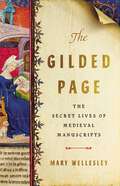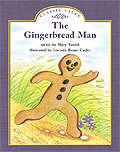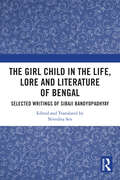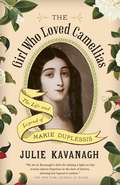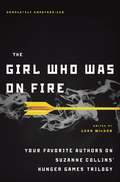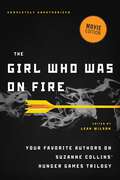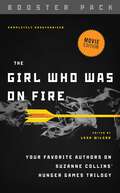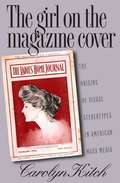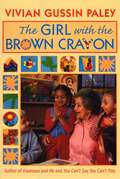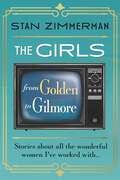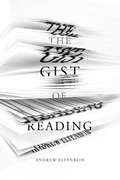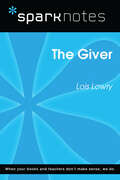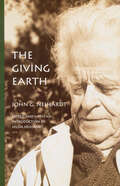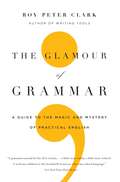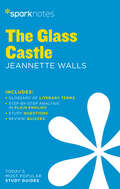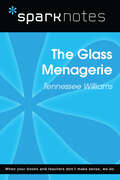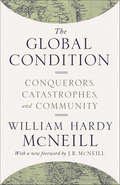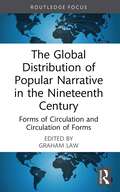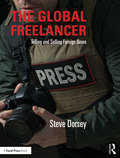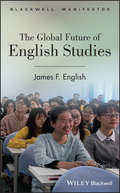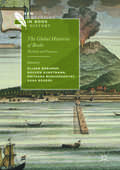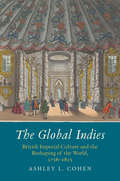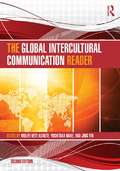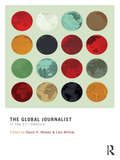- Table View
- List View
The Gilded Page: The Secret Lives of Medieval Manuscripts
by Mary WellesleyA breathtaking journey into the hidden history of medieval manuscripts, from the Lindisfarne Gospels to the ornate Psalter of Henry VIII&“A delight—immersive, conversational, and intensely visual, full of gorgeous illustrations and shimmering description.&” –Helen Castor, author of She-WolvesMedieval manuscripts can tell us much about power and art, knowledge and beauty. Many have survived because of an author&’s status—part of the reason we have so much of Chaucer&’s writing, for example, is because he was a London-based government official first and a poet second. Other works by the less influential have narrowly avoided ruin, like the book of illiterate Margery Kempe, found in a country house closet, the cover nibbled on by mice. Scholar Mary Wellesley recounts the amazing origins of these remarkable manuscripts, surfacing the important roles played by women and ordinary people—the grinders, binders, and scribes—in their creation and survival.The Gilded Page is the story of the written word in the manuscript age. Rich and surprising, it shows how the most exquisite objects ever made by human hands came from unexpected places.&“Mary Wellesley is a born storyteller and The Gilded Page is as good as historical writing gets. This is a sensational debut by a wonderfully gifted historian.&” —Dan Jones, bestselling author of The Plantagenets and The Templars
The Gingerbread Man (Fountas & Pinnell LLI Green #Level H, Lesson 83)
by Mary SandelFountas and Pinnell Leveled Literacy Intervention Green System -- 1st Grade
The Girl Child in the Life, Lore and Literature of Bengal: Selected Writings of Sibaji Bandyopadhyay
by Nivedita SenContemporary children’s literature in Bangla celebrates irreverent, defiant and deviant boys whose subversive doings critique the parenting and schooling they go through, while the girl child is neglected and marginalised. The rare fictional girls who show resilience and demand a normal childhood are consciously silenced, or contained and assimilated within unwritten masculinist norms. This book –a compilation of translated works of the author, critic and academic, Sibaji Bandyopadhyay –focuses on gender and childhood in Bengal.The book includes a translation of his Bangla Shishusahityer Chhoto Meyera (Little Girls in Bangla Children’s Literature), as well as a translated essay on Thakurma’ Jhuli (Grandma’s Sack), a collection of Bangla folk tales and fairytales from early twentieth century that underscores the subaltern role of adolescent female characters with hardly any agency or voice in the oral legends and folklore of Bengal. The translation of the piece ‘An Incredible Transition’ from Bandyopadhyay’s Abar Shishushiksha (On Children’s Education Again) applauds the role of Indian social reformers and British educationists in initiating women’s education in Bengal, while questioning the erasure of protagonists who are girls in the nineteenth-century primers.Interrogating gendered constructions in diverse genres of literature while revisiting the subject of female education, this book will be of interest to students of children’s literature, comparative literature, popular literature, gender studies, translation studies, culture studies and South Asian writings.
The Girl Who Loved Camellias: The Life and Legend of Marie Duplessis
by Julie KavanaghFrom the author of Nureyev, the definitive biography of the celebrated Russian dancer, now comes the astonishing and unknown story of Marie Duplessis, the courtesan who inspired Alexandre Dumas fils's novel and play La dame aux camélias, Giuseppe Verdi's opera La Traviata, George Cukor's film Camille, and Frederick Ashton's ballet Marguerite and Armand. Sarah Bernhardt, Eleonora Duse, Greta Garbo, Isabelle Huppert, Maria Callas, Anna Netrebko, and Margot Fonteyn are just a few of the celebrated actors, singers, and dancers who have portrayed her. Drawing on new research, Julie Kavanagh brilliantly re-creates the short, intense, and passionate life of the tall, pale, slender girl who at thirteen fled her brute of a father and Normandy to go to Paris, where she would become one of the grand courtesans of the 1840s. France's national treasure, Alexandre Dumas père, was intrigued by her, his son became her lover, and Franz Liszt, too, fell under her spell. Quick to adapt an aristocratic mien, with elegant clothes, a coach, and a grand apartment, she entertained a salon of dandies, writers, and artists. Fascinating to both men and women, Marie, with her stylish outfits and signature camellias, was always a subject of great interest at the opera or at the Café de Paris, where she sat at the table of the director of the Paris Opéra, along with the director of the Théâtre Variétés, the infamous dancer Lola Montez, and others. Her early death at age twenty-three from tuberculosis created an outpouring of sympathy, noted by Charles Dickens, who wrote in February 1847: "For several days all questions political, artistic, commercial have been abandoned by the papers. Everything is erased in the face of an incident which is far more important, the romantic death of one of the glories of the demi-monde, the beautiful, the famous Marie Duplessis." With The Girl Who Loved Camellias, Kavanagh has written a compelling and poignant life of a nineteenth-century muse whose independent and modern spirit has timeless appeal.
The Girl Who Was on Fire
by Ned Vizzini Adrienne Kress Sarah Darer Littman Carrie Ryan Bree Despain Jennifer Lynn Barnes Cara Lockwood Sarah Rees Brennan Lili Wilkinson Leah Wilson Mary Borsellino Terri Clark Blythe Woolston Elizabeth M. ReesKatniss Everdeen's adventures may have come to an end, but her story continues to blaze in the hearts of millions worldwide.In The Girl Who Was on Fire, thirteen YA authors take you back to Panem with moving, dark, and funny pieces on Katniss, the Games, Gale and Peeta, reality TV, survival, and more. From the trilogy's darker themes of violence and social control to fashion and weaponry, the collection's exploration of the Hunger Games reveals exactly how rich, and how perilous, protagonist Katniss' world really is. How does the way the Games affect the brain explain Haymitch's drinking, Annie's distraction, and Wiress' speech problems? What does the rebellion have in common with the War on Terror? Why isn't the answer to "Peeta or Gale?" as interesting as the question itself? What should Panem have learned from the fates of other hedonistic societies throughout history-and what can we?The Girl Who Was on Fire covers all three books in the Hunger Games trilogy.CONTRIBUTORS: .Jennifer Lynn Barnes, Mary Borsellino, Sarah Rees Brennan, Terri Clark, Bree Despain, Adrienne Kress, Cara Lockwood, Elizabeth M. Rees, Carrie Ryan, Ned Vizzini, Lili Wilkinson, Blythe Woolston, Sarah Darer Littman
The Girl Who Was on Fire (Movie Edition): Your Favorite Authors on Suzanne Collins' Hunger Games Trilogy
by Brent Hartinger Diana PeterfreundIncludes 3 brand new essays on Gale, the Games, and Mockingjay! **Already read the first edition of The Girl Who Was on Fire? Look for The Girl Who Was on Fire - Booster Pack to get just the three new essays and the extra movie content.** Katniss Everdeen's adventures may have come to an end, but her story continues to blaze in the hearts of millions worldwide. In The Girl Who Was on Fire - Movie Edition, sixteen YA authors take you back to the world of the Hunger Games with moving, dark, and funny pieces on Katniss, the Games, Gale and Peeta, reality TV, survival, and more. From the trilogy's darker themes of violence and social control to fashion and weaponry, the collection's exploration of the Hunger Games reveals exactly how rich, and how perilous, Panem, and the series, really is. How does the way the Games affect the brain explain Haymitch's drinking, Annie's distraction, and Wiress' speech problems? What does the rebellion have in common with the War on Terror? Why isn't the answer to &“Peeta or Gale?" as interesting as the question itself? What should Panem have learned from the fates of other hedonistic societies throughout history—and what can we? CONTRIBUTORS: Jennifer Lynn Barnes, Mary Borsellino, Sarah Rees Brennan, Terri Clark, Bree Despain, Adrienne Kress, Sarah Darer Littman, Cara Lockwood, Elizabeth M. Rees, Carrie Ryan, Ned Vizzini, Lili Wilkinson, Blythe Woolston, Diana Peterfreund (NEW), Brent Hartinger (NEW), Jackson Pearce (NEW)
The Girl Who Was on Fire - Booster Pack: Your Favorite Authors on Suzanne Collins' Hunger Games Trilogy
by Brent Hartinger Diana PeterfreundThis e-book only Booster Pack is designed for readers who have read the first edition of The Girl Who Was on Fire. The Booster Pack includes ONLY the three brand new essays included in The Girl Who Was on Fire - Movie Edition, plus access to 10,000 words of extra, e-book only content: the contributors' thoughts on the Hunger Games film. The first edition of The Girl Who Was on Fire offered even more to think about for readers already engrossed by the world of the Hunger Games. From the trilogy's darker themes of violence and social control to reality television, fashion and weaponry, the collection's exploration of the Hunger Games by other YA writers revealed exactly how rich, and how perilous, protagonist Katniss' world really is. These three new essays discuss game theory in the Hunger Games, mixed opinions about Mockingjay, and why we shouldn't forget about Gale, just because Katniss chose Peeta. This e-book also gives you access to special content from our writers right after the release of The Hunger Games on the big screen: their thoughts on the film.
The Girl on the Magazine Cover: The Origins of Visual Stereotypes in American Mass Media
by Carolyn KitchFrom the Gibson Girl to the flapper, from the vamp to the New Woman, Carolyn Kitch traces mass media images of women to their historical roots on magazine covers, unveiling the origins of gender stereotypes in early-twentieth-century American culture.Kitch examines the years from 1895 to 1930 as a time when the first wave of feminism intersected with the rise of new technologies and media for the reproduction and dissemination of visual images. Access to suffrage, higher education, the professions, and contraception broadened women's opportunities, but the images found on magazine covers emphasized the role of women as consumers: suffrage was reduced to spending, sexuality to sexiness, and a collective women's movement to individual choices of personal style. In the 1920s, Kitch argues, the political prominence of the New Woman dissipated, but her visual image pervaded print media. With seventy-five photographs of cover art by the era's most popular illustrators, The Girl on the Magazine Cover shows how these images created a visual vocabulary for understanding femininity and masculinity, as well as class status. Through this iconic process, magazines helped set cultural norms for women, for men, and for what it meant to be an American, Kitch contends.
The Girl with the Brown Crayon
by Vivian G. PaleyOnce again Vivian Paley takes us into the inquiring minds and the dramatic worlds of young children learning in the kindergarten classroom.
The Girl's Like Spaghetti: Why, You Can't Manage Without Apostrophes!
by Lynne Truss Bonnie TimmonsA giant kids' playground certainly sounds like fun, but you might want to watch out in the giant kid's playground; he has a tendency to step on people. A sign stating, "we're here to help", would definitely disappoint the customers if the apostrophe were removed. Lynne Truss and Bonnie Timmons once again illustrate the hilarious confusion that punctuation can cause.
The Girls: From Golden to Gilmore
by Stan Zimmerman&“...the very definition of a page-turner. READ THIS BOOK!&” – Colin Mochrie, &“Whose Line is It Anyway?,&” &“Hyprov&” Featured on Watch What Happens Live! With Andy Cohen, People Magazine, Queerty Magazine, Fox Digital News, The New York Post, The Daily Mail, The Hollywood Reporter, and Out Magazine.The Girls: From Golden to Gilmore is the story of Stan Zimmerman, a gawky Jewish boy who dreamed of becoming a wildly successful actor, rich enough to build his own mansion in the Hollywood Hills. While the actor part didn't quite pan out, Stan found success as a writer, producer, director, and playwright, working on such shows as The Golden Girls, Roseanne, and Gilmore Girls. Growing up in a small suburb of Detroit, Michigan, Stan was surrounded by three strong, intelligent women-his mother, his grandmother, and his sister-all of whom supported his imagination and creativity. Instead of playing outside, he spent time in his basement directing and acting in plays with the neighborhood kids. At seven-and-a-half years old, he was the youngest student accepted into a prestige summer theater school program. After high school, he was awarded a work/study scholarship to NY/Circle in the Square, where he met his first serious boyfriend and became Andy Warhol's unwitting photo subject one night at Studio 54. He also met Jim Berg, a journalism student at NYU's University Without Walls, forming a writing partnership that has continues to this day. partnership to this day. Their latest project is naturally an all-star, female ensemble Christmas comedy movie for Lifetime! Throughout his life, most of Stan's friendships have been with females. He credits those friendships and the women in his family with his ability to connect with creative women who have played a part in his career success. Accompanied by journal entries, The Girls details Stan's relationships with some of entertainment's most notable women, including Roseanne Barr, Lily Tomlin, Sandra Bernhard, Lauren Graham and Alexis Bledel, and, of course, all four Golden Girls. The Girls: From Golden to Gilmore is a candid, funny, and sometimes poignant testimony about how a young boy turned his dream into reality.
The Gist of Reading
by Andrew ElfenbeinWhat happens to books as they live in our long-term memory? Why do we find some books entertaining and others not? And how does literary influence work on writers in different ways? Grounded in the findings of empirical psychology, this book amends classic reader-response theory and attends to neglected aspects of reading that cannot be explained by traditional literary criticism. Reading arises from a combination of two kinds of mental work: automatic and controlled processes. Automatic processes, such as the ability to see visual symbols as words, are the result of constant practice; controlled processes, such as predicting what might occur next in a story, arise from readers' conscious use of skills and background knowledge. When we read, automatic and controlled processes work together to create the "gist" of reading, the constant interplay between these two kinds of processes. Andrew Elfenbein not only explains how we read today, but also uses current knowledge about reading to consider readers of past centuries, arguing that understanding gist is central to interpreting the social, psychological, and political impact of literary works. The result is the first major revisionary account of reading practices in literary criticism since the 1970s.
The Giver (SparkNotes Literature Guide Series #8)
by SparkNotesThe Giver (SparkNotes Literature Guide) by Lois Lowry Making the reading experience fun! When a paper is due, and dreaded exams loom, here's the lit-crit help students need to succeed! SparkNotes Literature Guides make studying smarter, better, and faster. They provide chapter-by-chapter analysis; explanations of key themes, motifs, and symbols; a review quiz; and essay topics. Lively and accessible, SparkNotes is perfect for late-night studying and paper writing. Includes: • 16 pages devoted to writing a literary essay including: a glossary of literary terms • Step-by-step tutoring on how to write a literary essay • A feature on how not to plagiarize
The Giving Earth: A John G. Neihardt Reader
by John G. NeihardtInternationally known for Black Elk Speaks and A Cycle of the West, John G. Neihardt (1881–1973) wrote in almost all major genres: fiction, lyric and epic poetry, biography, autobiography, travelogue, literary criticism, and the familiar essay. The Giving Earth includes nearly forty selections representing every phase of Neihardt’s art, from the passionate poetry of his youth to the masterworks of his maturity to the lapidary reflections of his old age. In her introduction, Hilda Neihardt, who was with her father when he interviewed Black Elk at Pine Ridge, provides many personal details surrounding the publication of his works. She also introduces each section. Included among the early lyrics are "Let Me Live Out My Years." The short stories that brought him his first fame are represented by "Dreams Are Wiser Than Men" and the memorably horrific "Alien." An excerpt from The River and I documents a trip down the Missouri as atmospheric and eventful as any described by Mark Twain. A Cycle of the West, the five-volume masterwork written over nearly thirty years, receives its due with chapters from The Song of Three Friends, The Song of Hugh Glass, The Song of Jed Smith, The Song of the Indian Wars, and The Song of the Messiah. The extent of Neihardt's achievement is apparent long before the reader comes to the selections from the classic Black Elk Speaks and the fine, late novel When the Trees Flowered. Concluding the anthology are selections from the literary criticism that helped form his philosophy of literature and the autobiographical writing of his twilight years. The Giving Earth is the gift of a writer's generous spirit and unlimited imagination.
The Glamour of Grammar: A Guide to the Magic and Mystery of Practical English
by Roy Peter ClarkEarly in the history of English, the words "grammar" and "glamour" meant the same thing: the power to charm. Roy Peter Clark, author of Writing Tools, aims to put the glamour back in grammar with this fun, engaging alternative to stuffy instructionals. In this practical guide, readers will learn everything from the different parts of speech to why effective writers prefer concrete nouns and active verbs. THE GLAMOUR OF GRAMMAR gives readers all the tools they need to"live inside the language"--to take advantage of grammar to perfect their use of English, to instill meaning, and to charm through their writing. With this indispensable book, readers will come to see just how glamorous grammar can be.
The Glass Castle SparkNotes Literature Guide (SparkNotes Literature Guide Series)
by SparkNotesCreated by Harvard students for students everywhere, SparkNotes give you just what you need to succeed in school: Complete Plot Summary and AnalysisKey Facts About the WorkAnalysis of Major CharactersThemes, Motifs, and SymbolsExplanation of Important QuotationsAuthor&’s Historical ContextSuggested Essay Topics25-Question Review QuizThe Glass Castle features explanations of key themes, motifs, and symbols including: strength from hardship; abuse; fire; compassion vs. boundaries; the glass castle; Joshua tree. It also includes detailed analysis of these important characters: Jeannette Walls; Dad (Rex Walls); Mom (Rose Mary Walls).
The Glass Menagerie (SparkNotes Literature Guide Series)
by SparkNotesThe Glass Menagerie (SparkNotes Literature Guide) by Tennessee Williams Making the reading experience fun! Created by Harvard students for students everywhere, SparkNotes is a new breed of study guide: smarter, better, faster.Geared to what today's students need to know, SparkNotes provides:chapter-by-chapter analysis explanations of key themes, motifs, and symbols a review quiz and essay topics Lively and accessible, these guides are perfect for late-night studying and writing papers.
The Global Condition: Conquerors, Catastrophes, and Community
by William Hardy McNeillWilliam H. McNeill is known for his ability to portray the grand sweep of history. The Global Condition is a classic work for understanding the grand sweep of world history in brief compass. Now with a new foreword by J. R. McNeill, this book brings together two of William Hardy McNeill's popular short books and an essay. The Human Condition provides a provocative interpretation of history as a competition of parasites, both biological and human; The Great Frontier questions the notion of "frontier freedom" through an examination of European expansion; the concluding essay speculates on the role of catastrophe in our lives.
The Global Distribution of Popular Narrative in the Nineteenth Century: Forms of Circulation and Circulation of Forms (Routledge Focus on Literature)
by Graham LawThe principal aim of this collection of articles is to explore the evolving generic patterns and the modes of transnational distribution of popular narrative over the course of the nineteenth century. This volume addresses networks of reception drawn around cities as diverse as Constantinople, Moscow, and Tokyo, with a focus on peripheries in South and West Asia, and Northern as well as Eastern Europe; in generic terms, there are specific investigations of shipwreck narratives, satirical cartoons, press reports, orally transmitted folklore, traditional sacred tales, and adventure novels. It combines the materialist approach of book/media history with the aesthetic insights of literary and cultural studies, drawing inspiration from the seminal work of scholars such as Benedict Anderson, Franco Moretti, Pascale Casanova, and Arjun Appadurai.
The Global Freelancer: Telling and Selling Foreign News
by Steve DorseyIn The Global Freelancer, award-winning journalist Steve Dorsey draws on his own experiences, as well as those of fellow reporters and editors, to instruct aspiring freelancers on all aspects of becoming a foreign correspondent. Topics covered include: delivering successful story pitches, location scouting, navigating foreign work documentation and visa requirements, confronting press freedom restrictions, leveraging digital media opportunities, and the new challenges of reporting from conflict zones safely. As newspapers and networks are forced to close their overseas bureaus, news organizations are relying more than ever before on freelancers to fill the gap. This book offers the freelance foreign correspondents of tomorrow step-by-step guidance on how to seize these opportunities and make a name in this competitive field. Packed with practical guidance, tips, and anecdotes from working professionals, The Global Freelancer is your gateway to a career in foreign journalism.
The Global Future of English Studies (Wiley-Blackwell Manifestos #67)
by James F. EnglishThe Global Future of English Studiespresents a succinct, carefully documented assessment of the current state and future trajectory of English studies around the world. Compiles data on student enrollments, faculty hiring, and financing in English studies around the world including China, home to more English majors than the U.S. and U.K. combined Rejects prevailing narratives of contraction and decline that dominate histories of the discipline Stresses English studies' expansion within a rapidly expanding global academic apparatus, and the new challenges and opportunities such sudden and dispersive growth presents Essential reading for anyone interested in studying or teaching English in higher education
The Global Histories of Books
by Elleke Boehmer Rouven Kunstmann Priyasha Mukhopadhyay Asha RogersThis book is an edited volume of essays that showcases how books played a crucial role in making and materialising histories of travel, scientific exchanges, translation, and global markets from the late-eighteenth century to the present. While existing book historical practice is overly dependent on models of the local and the national, we suggest that approaching the book as a cross-region, travelling - and therefore global- object offers new approaches and methodologies for a study in global perspective. By thus studying the book in its transnational and inter-imperial, textual, inter-textual and material dimensions, this collection will highlight its key role in making possible a global imagination, shaped by networks of print material, readers, publishers and translators.
The Global Indies: British Imperial Culture and the Reshaping of the World, 1756-1815 (The Lewis Walpole Series in Eighteenth-Century Culture and History)
by Ashley L. CohenA study of British imperialism&’s imaginative geography, exploring the pairing of India and the Atlantic world from literature to colonial policy In this lively book, Ashley Cohen weaves a complex portrait of the imaginative geography of British imperialism. Contrary to most current scholarship, eighteenth-century Britons saw the empire not as separate Atlantic and Indian spheres but as an interconnected whole: the Indies. Crisscrossing the hemispheres, Cohen traces global histories of race, slavery, and class, from Boston to Bengal. She also reveals the empire to be pervasively present at home, in metropolitan scenes of fashionable sociability. Close-reading a mixed archive of plays, poems, travel narratives, parliamentary speeches, political pamphlets, visual satires, paintings, memoirs, manuscript letters, and diaries, Cohen reveals how the pairing of the two Indies in discourse helped produce colonial policies that linked them in practice. Combining the methods of literary studies and new imperial history, Cohen demonstrates how the imaginative geography of the Indies shaped the culture of British imperialism, which in turn changed the shape of the world.
The Global Intercultural Communication Reader
by Molefi Kete Asante Yoshitaka Miike Jing YinThe Global Intercultural Communication Reader is the first anthology to take a distinctly non-Eurocentric approach to the study of culture and communication. In this expanded second edition, editors Molefi Kete Asante, Yoshitaka Miike, and Jing Yin bring together thirty-two essential readings for students of cross-cultural, intercultural, and international communication. This stand-out collection aims to broaden and deepen the scope of the field by placing an emphasis on diversity, including work from authors across the globe examining the processes and politics of intercultural communication from critical, historical, and indigenous perspectives. The collection covers a wide range of topics: the emergence and evolution of the field; issues and challenges in cross-cultural and intercultural inquiry; cultural wisdom and communication practices in context; identity and intercultural competence in a multicultural society; the effects of globalization; and ethical considerations. Many readings first appeared outside the mainstream Western academy and offer diverse theoretical lenses on culture and communication practices in the world community. Organized into five themed sections for easy classroom use, The Global Intercultural Communication Reader includes a detailed bibliography that will be a crucial resource for today's students of intercultural communication.
The Global Journalist in the 21st Century (Routledge Communication Ser.)
by Lars Willnat David H. WeaverThe Global Journalist in the 21st Century systematically assesses the demographics, education, socialization, professional attitudes and working conditions of journalists in various countries around the world. This book updates the original Global Journalist (1998) volume with new data, adding more than a dozen countries, and provides material on comparative research about journalists that will be useful to those interested in doing their own studies. The editors put together this collection working under the assumption that journalists’ backgrounds, working conditions and ideas are related to what is reported (and how it is covered) in the various news media round the world, in spite of societal and organizational constraints, and that this news coverage matters in terms of world public opinion and policies. Outstanding features include: Coverage of 33 nations located around the globe, based on recent surveys conducted among representative samples of local journalists Comprehensive analyses by well-known media scholars from each country A section on comparative studies of journalists An appendix with a collection of survey questions used in various nations to question journalists As the most comprehensive and reliable source on journalists around the world, The Global Journalist will serve as the primary source for evaluating the state of journalism. As such, it promises to become a standard reference among journalism, media, and communication students and researchers around the world.
